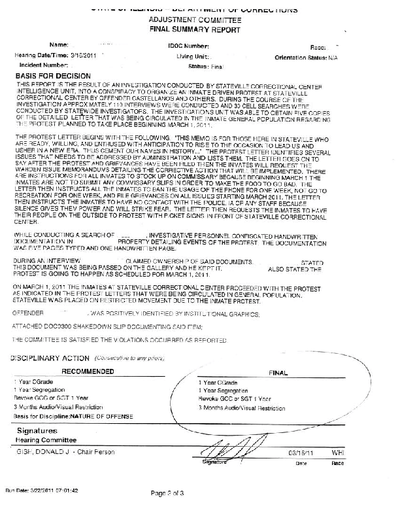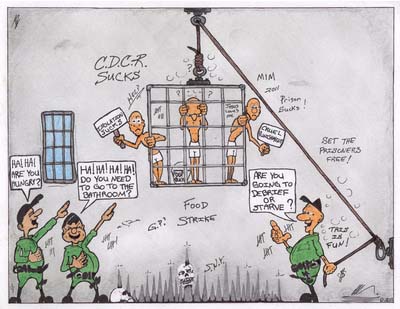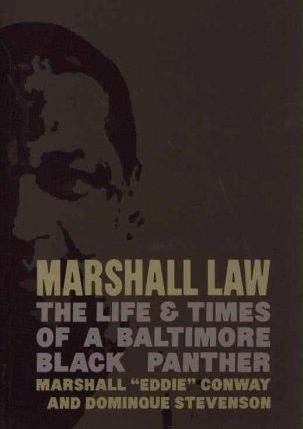This papyrus is to all United Front (UF) lumpen organizations (LOs) who
are plenipotentiary strawboss [this refers to chiefs who claim complete
authority over their local group]. And some items will have a unique
affinity to those who strive and struggle in a Growth and Development
pose. And in that case, I will be specific to whom those items are
geared towards.
Some serious questions have been presented to ULK on matters
that will either keep or further dissimulate any form of umoja [unity]
among the LOs that have expressed an interest in UF.
Umoja over Dissimulation
[Biographical info removed per security policy. In contrast to those who
are “plenipotentiary strawbossing,” the author claims deep history in a
disciplined structure. We will let h credentials speak through what h
has to offer in the form of ideas. - Editor]
In a 9 November 1999 column in the Final Call newspaper, my
lumpen chief reiterated a previous call for unity and peace among the
LOs, specifically in the mid-west. However, in laying out his nationwide
peace and unity initiative in book format in 1996, he let it be known
that our “vision” for Growth and Development was one for universal unity
and peace. Hence,
this United
Front (UF) project is consistent with my brother’s vision.
In the 26 September 2011 letter to United Front members from
MIM(Prisons) the proposition set forth was the struggle certain LOs are
having in putting their differences to the side. It should be understood
that grown women and men have to make tough decisions. Significant among
them is the making of personal and collective sacrifices being asked for
that don’t merely serve you and a few of your homies or comrades. The
sacrifice here is for collective LO unity, which will benefit the future
of all of our collective kith and kin. This is what it means to become
part of a class struggle, the lumpen being a class. In signing on to the
UF, you have to join the collective interest.
In ULK
17(November/December 2010), UF was defined for all: “United
Front is the theory of uniting different groups across class lines
for a common goal or interest, while maintaining independence where
those groups disagree. The application of united front theory is about
recognizing different contradictions in society and utilizing them in
the interests of the international proletariat.”(p. 1
“Building
United Front Surrounded by Enemies”)
In that same issue of ULK, and on the same page, under the
title
“Lumpen
United Front: Its Basis and Development” it stated “The basis for
unity among lumpen is class. The lumpen are the disenfranchised
who derive from the economically depressed areas – the Barrios and
ghetto projects – and are for the most part oppressed nations people.
The lumpen are known to the oppressor nation as the ‘criminal element’
which is code word for persyn of color. The lumpen usually come from a
lumpen organization that the oppressors call a ‘gang,’ or survive as
some type of parasitic hustler.”
In ULK 22
(September/October 2011)
the
United Front principles were enunciated and have been reprinted in
each issue since. The five principles were direct and extremely clear.
LOs started writing to be with it. So no LO should be confused as to
what is expected of them and what is required of them based upon their
own pledges of unity and peace.
Historically Long and Deep-Rooted Feuds
Those who have or are dealing with this issue should do one of three
things:
-
They can settle their differences among themselves (the two
conflicting/feuding LOs) which should be done as expeditiously as
practical.
-
Call upon a congress of six. The congress of six (C-Six or C-Six
Session) will be composed by each feuding LO in the conflict picking
three LO reps from a neutral LO not involved in the issue, to represent
that particular LO’s interest. And the other LO in the conflict shall
pick three for theirs. That C-Six shall bring a resolution to those LOs’
problems and it shall be binding upon both and all its members and
factions, based upon umoja, or unity pledge each LO gave upon the second
principle of the UF mission and goal statement.
-
If one, two, or more LOs cannot bring resolution to their beefing and
feuding employing any of the former two offerings, a UF congress shall
be called by any UF LO reps and all LOs who signed on shall bring a
resolution to those two LOs’ problems. If the resolution is not embraced
by the feuding LOs the UF congress should take exclusion measures or
other UF fealty measures.
If we are serious about this, these suggestions shouldn’t be a
problem. I know from personal experience and universal education and
training that many of the LOs already have such conflict resolution
policies in play in the streets and behind enemy lines of the
oppressor’s machine. So this is not utopian in nature.
Ideally these C-Six resolutions should first be attempted in-house and
regionally before going multi-state and nationally. Let’s not be remiss
that the opposition to lumpen cohesion is reading our solutions and
resolutions. So it is to be expected that that same dynamic will put all
kinds of tools in force and effect to break the chain of unity. Among
them, their ease at censorship and suppression. That’s why it is
imperative LOs must be very judicious in how we are politicking this
movement in ULK. For this is a medium we cannot afford nor
permit to be short-circuited. So we should refrain, if possible, from
placing problems on the national stage if it’s possible to be resolved
in-house or in-state.
Baseless and petty allegations that cannot be judged and weighed across
the nation serve no good other than becoming the ham’s fodder to
rationalize oppressive-suppressive censorship programs. So it’s not good
to throw this on MIM(Prisons)’s or ULK’s door without proof.
Rebuilding Organizations
Now let’s move on to the contradictions within. If we aim to be truly
successful with this endeavor, all LOs must do some self-analyzing and
self-examination. Every formation, like the communities and families we
come from, have bad juju in their midsts. And we know this project is
not about transforming the economics of LOs (though we hope that the
good eventually have such an effect).
I think I can speak for all and say we wish to keep that kind of
debatable aspect of the LOs’ habits away from what we are striving to do
here. For contamination and cross-transference can happen very easily
and it’s something that quarter hams are greedily waiting for to not
only discredit us, but shut the movement down.
Here I will paraphrase Atiba Shanna from the “Vita Wa Watu” and apply
his ideas to our LOs: Each LO must emphasize re-building. We must
re-orient and re-organize based upon in-house examinations of our LO and
based upon what aspects of their mission need to be improved or omitted.
Because the self-destruction LOs engaged in in our previous structures,
and the reasons for it, wasn’t of a mere quantitative nature. That is,
the movement and our organizations didn’t suffer defeat (the mass
incarceration of each LO’s members, loss of lives and material and
political gains, schisms etc.) and set backs simply because of the
state’s repression, but also, primarily, because our “minds” aren’t
right for a vast majority of LOs and their governing bodies and rank. We
are wrong in thinking that we can resolve all our problems by doing
counterproductive/counterrevolutionary hustles and resolving all
conflicts among ourselves with not only the sword but the hammer and
anvil that built sword and spear. Our practice isn’t up to par.
And as another of my great teachers taught me: “If one plants an orchard
on a chemical dump without first digging it out and replacing it with
good soil, it will produce poisonous fruits.”
We have two million plus strong, oppressed beings in these county and
state psyche incinerators. We have some purchasing power. And we have
political power abstractly through the family unit. As field marshal of
the struggle, George Jackson stated: “A good deal of this has to do with
our ability to communicate to the people on the street. The nature of
the function of the piston (system) within the police state has to be
continuously explained, elucidated to the people on the street because
we can’t fight alone in here… We can fight, but if we’re isolated, if
the state is successful in accomplishing that, the results are usually
not constructive in terms of proving our point. We fight and we die, but
that’s not the point, although it may be admirable from some sort of
purely moral point of view. The point is, however, in the face of what
we confront, to fight and win. That’s the real objective: not just to
make statements, no matter how noble, but to destroy that system that
oppresses us.”(Cages of Steel p. 179)
All scientific knowledge and experiments must evolve. Things
that may have or were once working for an LO may not cut it in today’s
world. Conditions are changing. Just look at the amount of power and
force being aimed at the LOs.
We cannot stay stuck in the same old “spear over gun” syndrome/mentality
that got Shaka Zulu killed. He and others refused to fight with guns at
first, but instead insisted on fighting guns (in the enemies’ hands)
with Zulu specialized spears in colonial Afrika. Similarly in the dawn
of the civil rights movement we saw this approach reintroduced by
promoting prayer over protest. Later protest had completed its role, but
people still promoted it over “self-defense” and “self-determination” in
the late 60s and 70s. Now it’s greed over respectable and righteous
hustling; the individual over the collective LO; dissimulation over
unification.
Most of all the older LOs have some chimera elements in regards to their
political philosophies, and those have evolved to the point where
capitalism is the end of all means. Even loyalty has a price tag. The
nationalism and anti-establishment fight against oppression is relegated
to their lit of old and passing stories of the old homies and history
books. With “getting money” the ends of all means, no cohesive political
line can be drawn. So we must, under the UF banner, agree to some basic
principles that we can unite around.
We have witnessed where and what tribalism (in excess) and wars bring.
It permits others to oppress and disrespect us more than any LO I ever
knew has done to me and my LO. Yet we don’t fight the oppressors with
the same zeal and hatred we direct towards each other for lesser
disrespect and abuse. Therefore, UF should be the highest priority among
the vanguard of each lumpen, and the women and men steering said LOs.
We would be fools to believe that designs are not in play to do away
with those who are moving to end oppression. According to a news release
a week or so ago, the department of just-us claims that the U.$. has
33,000 LOs nationwide with 1.4 million members. It’s not known if they
are counting those behind concrete and steel or not. Regardless of the
truth in the numbers, these figures serve one thing: a notice that they
see a problem to be addressed. When you release propaganda or statistics
like that, they serve a greater point.
We know they take our existence very serious, united or not. The
question to all LOs is whether we are going to take our existence
serious or not, and act. There is a saying attributed to Nat Turner and
his struggle that “we can either all hang together for fighting or hang
separate as comrades who did nothing.”











